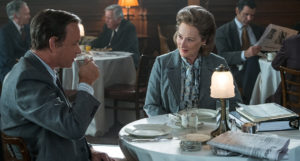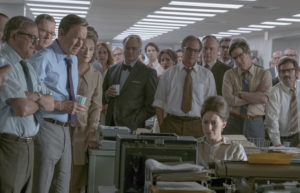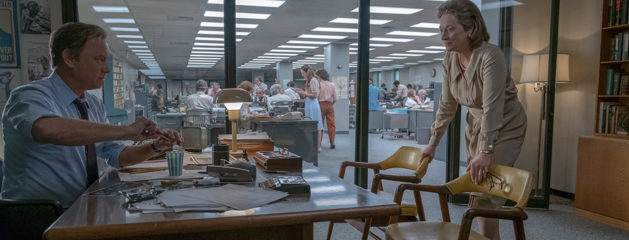Filmgoing Friends & Family: First, full disclosure, my mini-film review of “The Post” that follows is biased. Let me explain how and why. First, it was my birthday and I invited friends to join me for a matinee and post-film discussion.
Many arrived with birthday cards or gifts in hand, when in fact their presence as filmgoing companions was the real gift. Close to two dozen friends joined me for the film and 10 remained behind for the post-film critique. And, for the first time in my entire life, people sang “Happy Birthday” to me in a full theater on a winter’s frigid afternoon. It warmed me right up.
My backstory: In 1971 when the Pentagon Papers were released by Daniel Ellsberg and first published by the NYT, followed by The Washington Post, which is the basis for this film, I was a 21-year-old budding political-activist and college drop-out. I dropped out of the University of Wisconsin following The Moratorium to End the War in Vietnam in 1969 when protesters marched in cities all over America. My education shifted from the classroom to the streets.
Recently, I watched “All the President’s Men” again for the third or fourth time. Jason Robards, Jr. won a Best Supporting Actor Oscar for his portrayal of Ben Bradlee of The Washington Post. Lastly, HBO premiered an excellent documentary, “Newspaper Man: The Life & Times of Ben Bradlee.” The preceding experiences and viewings primed me for this film that has been receiving award nominations and accolades.
Now to the film: Steven Spielberg, screenwriters, cinematographers, and actors bring the story to life. Though it takes place in 1971, the story based on actual events, unfolds in a conventional linear narrative style to keep the audience on track. It was reminiscent for me of the studio movies from the 1940s and 1950s. John Williams score also telegraphed suspense and mystery, crescendos of emotion to complement the action.

The cast, featuring Meryl Streep as Katherine Graham, owner/publisher of The Post, and Tom Hanks as Ben Bradlee, executive editor, were in capable hands, however some of the feedback from filmgoing friends is that unknown, or lesser known actors may have delivered more nuanced and refreshing performances. It’s difficult to “suspend one’s disbelief” by watching these two revered and awarded actors perform while their celebrity is ever present. The supporting cast was pitch perfect and as an ensemble compelling and credible.
The themes couldn’t be more timely, misogyny in the workplace, the government misleading the public and hiding the truth, and the free press fighting to reveal the truth and represent the governed, not the governors. There is an impassioned speech near the end of the film which connects the dots of the lessons of history and the challenges we face today to protect freedom of the press and democracy.
For me, one more personal chapter of my story, I came to the University of Wisconsin – Madison in the summer of 1967 and attended a journalism workshop for high school students. I knew I wanted to be a journalist. I was the first editor of our high school newspaper at J. I. Case in Racine, Wisconsin, “Just In Case” (I also named the paper, you can blame me for the acronym). I majored in Journalism until I dropped out of school, and when I returned to college years later, I majored in Communication Arts.
I also worked for many years in the printing and graphic arts industries, first screen-printing, and later, offset, web, lithographic and digital printing. I was a print buyer and worked in the gift wrap, publishing, and public relations fields. I spent many days and nights conducting press checks watching large web presses roll after the head pressman pushed the button and the alarm sounded so people would clear out of the way as the presses sped up. I can still smell the ink and paper, and remember the craftsmen and women I worked with in those industries. When the hot type was set and the presses rolled in “The Post” it was music to my ears. How could I not love this film?

NOR_D10_061217_0738_0732_R2_COMP – L-R: Howard Simons (David Cross), Frederick “Fritz” Beebe (Tracy Letts), Ben Bradlee (Tom Hanks), Kay Graham (Meryl Streep), Arthur Parsons (Bradley Whitford), Chalmers Roberts (Philip Casnoff), Paul Ignatius (Brent Langdon), Meg Greenfield (Carrie Coon, seated) and other members of The Washington Post in Twentieth Century Fox’s THE POST. Photo Credit: Niko Tavernise.

